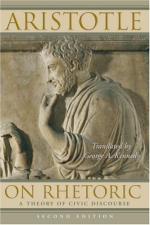
|
| Name: _________________________ | Period: ___________________ |
This test consists of 5 multiple choice questions, 5 short answer questions, and 10 short essay questions.
Multiple Choice Questions
1. To Aristotle, when did anger take place?
(a) When someone had been wronged or desired revenge.
(b) When someone was afraid, had been wronged, or desired revenge.
(c) When someone was afraid or desired revenge.
(d) When someone was afraid or had been wronged.
2. Included in Aristotle's definition of a rhetorician, which parts of a claim should be adapted to a situation?
(a) Speech, tone, and style.
(b) Speech and style, but not tone.
(c) Tone and style, but not speech.
(d) Speech and tone, but not style.
3. Based on Aristotle's explanation, what was the difference between envy and emulation?
(a) Envy is about wanting the goods for oneself while emulation is about wanting another person to lose their goods.
(b) Envy is about wanting another to lose their goods while emulation is about wanting the goods for oneself.
(c) Envy can only be directed towards another person while emulation can be about a situation.
(d) Envy can be about a situation while emulation can only be directed towards another person.
4. How did Aristotle think the political orator should be able to speak about the good?
(a) Knowledgeably.
(b) Briefly.
(c) Extensively.
(d) Candidly.
5. Who did Aristotle think must obey the general law?
(a) Over half of humanity.
(b) All of humanity.
(c) At least half of humanity.
(d) At least three quarters of humanity.
Short Answer Questions
1. As explained in Book I, Chapter 10, what did the general law refer to?
2. As explained in Book I, Chapter 3, which type of rhetoric attempted to convince a legislature to take a particular action?
3. Which type(s) of happiness was Aristotle referring to in Book I, Chapter 5?
4. In addition to the relationships with other countries, what other part of war and peace did Aristotle explain?
5. What was included in the special laws referenced by Aristotle?
Short Essay Questions
1. How was the emotional appeal defined by Aristotle?
2. What benefits might ancient witnesses and recent witnesses have for legal rhetoric?
3. What was considered pleasant and unpleasant for the forensic speaker?
4. What was Aristotle's explanation of fear and confidence?
5. Besides war and peace and national defense, what other subjects of political oratory did Aristotle include in Book 1, Chapter 4?
6. How did Aristotle explain the good and the useful in terms of political rhetoric?
7. How was justice described by Aristotle and why was virtue a significant part of rhetoric?
8. What was the logical appeal that Aristotle referred to and when would it be used?
9. Which causes of human action did Aristotle outline in Book I, Chapter 10, and which ones were voluntary?
10. What distinction did Aristotle make between war and peace and national defense as subjects of political oratory?
|
This section contains 940 words (approx. 4 pages at 300 words per page) |

|




